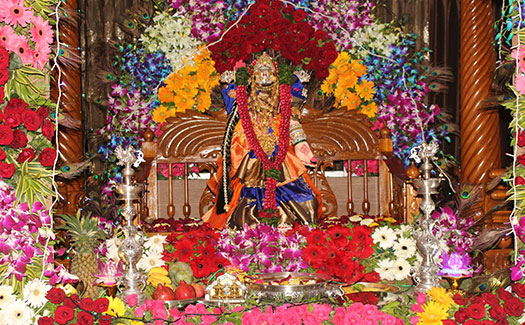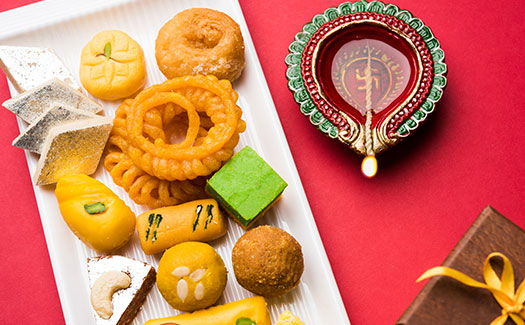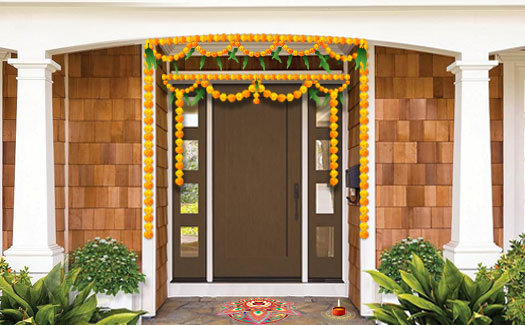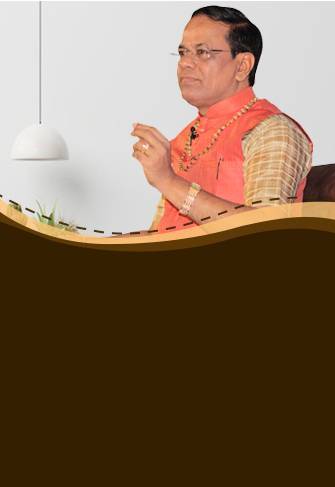The ‘festival of lights’ represents the symbolic victory of good over evil, light over darkness, and knowledge over ignorance. ‘Deepa Pratipada Utsava’ or simply Diwali marks the beginning of celebrating light as festival. Deepa means lamp, Pratipada means initiation and Utsava means festival. It is celebrated over several days.
Various cultures and religions have various historical stories as backgrounds to celebrate Diwali. While primarily known as a Hindu festival for followers of ancient Vedic culture and tradition, the festival is also celebrated across the world by other faiths like Sikhs, Jains and Buddhists.
Hindus celebrate the death of the ruthless demon Narakasura killed by Lord Krishna on this very day. It is believed that Lord Ram, Sita and Laxman returned home after 14 years of vanavasa or exile, and the citizens of Ayodhya welcomed the divine trio by decorating the streets with diyas. This custom of lighting lamps on the days of the festival has continued to this day. Jains and Buddhists have their own historical events to support their celebration. Jains celebrate it as the day their 24th Guru Mahavira attained Nirvana. Buddhists celebrate by lighting lamps like they did when they welcomed Lord Gautam Buddha back to Kapilavastu after 18 years. Sikhs celebrate it as the homecoming of Guru Hargobind from prison.
Let us keep this history aside and think about the present situation. How many people celebrate Diwali, happily nowadays?
In this present situation where Covid-19 pandemic has made more than 8 crore individuals jobless, where do we stand in celebrating ‘Diwali 2020’? The pandemic has ruined the whole world economically, physically, mentally and socially. Businesses are facing huge losses and are experiencing a downfall.
This affects not only one person but the entire family and in such a circumstance how do they celebrate Diwali? Even during such difficult times, Indians celebrate Diwali by borrowing money from others. It might be because of the fear that if they do not do the poojas and rituals, Gods and Goddesses might get upset with them.
Why do we do a deep cleaning of the house/workplace during Diwali?

On the occasion of Diwali, we deep clean the house/workplace and throw away the unwanted non-working items or materials from the house.
Damaged electronic items like clocks, television, mixer, fan, computer, laptop, etc. or broken items like hanging lamps, glass items like plates, photo frames, flower vase, furniture, etc. must be removed from the house/workplace. These broken objects may also be an impediment to energy.
These unwanted items obstruct the flow of Universal Energy in the house/workplace. When we remove these unwanted items, Universal Energy flows smoothly and every family member feels calm and peaceful inside the house.
Why do we paint or whitewash our houses during Diwali?
If the painting of the walls have faded or peeled, some damages are present on the wall, it creates negativity around that area. Cleaning, repairing and painting or whitewashing the house helps to create a positive atmosphere inside the house.
Painting and whitewashing the house also helps to kill the pests. Diwali comes around the winter season and it is the breeding season of the insects. Closing up unwanted cracks and cleaning keeps the insects away. It keeps the place pleasant and manageable.

Why do we perform grand poojas during Diwali?

It is believed that performing elaborate and grand Diwali puja can help win the blessings of Goddess Mahalakshmi- the deity of wealth. The rituals are believed to invite prosperity, wealth, health and abundance into the household.
Why do we prepare a lot of sweets, snacks and wear new clothes during Diwali?
We make all types of mouth-watering traditional Diwali sweets and snacks during this festival of lights which are offered to the deity during the rituals and also gifted to our near and dear ones. The exchange of Diwali gifts, sweets and greetings of ‘Happy Diwali’ helps to maintain good relationships between family, friends, colleagues, etc. It is also a token of gratitude and also helps for long term association among businesses.

Wearing new clothes during the festive season is about appreciating oneself, feeling more confident and it also brings in a feeling of positivity within oneself.
Why do we give a lot of preference to the main door during Diwali?

The main door is always decorated with flowers, leaves of mango trees, and banana/plantain leaves, diwali lights, earthen diya decorations, etc. We also draw beautiful rangolis, symbols and footprints of Goddess Lakshmi outside the main door. This is an invitation to Goddess Lakshmi to enter our homes and bring in prosperity, wealth and happiness. These activities form the basis of our belief and faith in gods, rituals, festivals and celebrations.
If you ask literally, “have you ever seen God/Goddess? The answer would be a clear “No!” And if you ask, “Where is God/Goddess?” The answer is everywhere.
God/Goddess are invisible but are present everywhere. In the same way, there is an invisible life force in the universe which we cannot see and it is also present everywhere, which is Universal Energy.
When God/Goddess and Universal Energy, both are invisible and present everywhere, why don’t we call God/Goddess as Universal Energy? When we invite Goddess Lakshmi into our homes, we are inviting Universal Energy into our homes.
Every faith/religion has its own supreme God – eg. Hindus have Lord Shiva/Lord Vishnu or Goddess Durga, Muslims have Allah and Christians have Jesus. The Universe has its Supreme God which is Universal Energy. Thus Universal Energy is the Universal Supreme God. This Universal Energy treats everyone equally and gives whatever you wish in life, irrespective of your religion.
But, just celebrating the festival and inviting God/Goddess or Universal Energy into our homes will not give us whatever we wish or need in life. It only helps to create a positive atmosphere in the house for about 15 days to a month. But we will fall back to our routine problems after the excitement of the moment or festival is over.
Surroundings are the place where we spend most of our time. We usually spend maximum time in our house/workplace. Out of the 24 hours, we spend around 20 hours in both these places.
ManavGuru’s Unique Saral Vaastu Guidance is a scientific principle and is based on ancient Indian values and culture. It reveals the path to an Anandmay Jeevan or Happy life for the entire family, irrespective of religion within 9 to 180 days just by connecting with Universal Energy.
The person has energy with some vibrational frequency. The place the person resides in or the workplace has energy with some vibrational frequency. The Universe also has some vibrational frequency. When both the person and the place are connected with Universal Energy, then Universal Energy channelizes in the body of the person and the place. This helps Universal Energy to be supplied to the trillions of cells in the body as and when required.
When trillions of cells and the organs in the body get sufficient Universal Energy; they become more energized and active. This ensures the smooth functioning of the whole body. As a result every family member becomes physically, mentally, socially, economically and intellectually stronger.
When you follow ManavGuru’s Unique Saral Vaastu Guidancesa, then within the next 9 to 180 days you and your family members will begin to experience Anandmay Jeevan or Happy Life. This is the actual prosperity and meaning of the festival of Diwali.

Transforming the lives of millions of families within 9 to 180 days with his divine knowledge.











